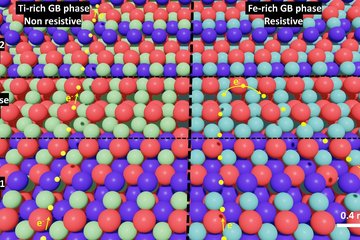All genres
621.
Talk
Design of structural materials by predictive ab initio thermodynamics: Challenges, applications and perspectives. Euromat Conference, Warsaw, Poland (2015)
622.
Talk
Formation Energy of Halide ions (Cl/Br/I) in water from ab-initio Molecular Dyna. Psi-k 2015 Conference, San Sebastián, Spain (2015)
623.
Talk
Quantum-mechanical approaches to address the structural and thermodynamic complexity of engineering materials. Swedish Chemical Society, Kalmar, Sweden (2015)
624.
Talk
Understanding the fundamental mechanisms behind H embrittlement: An ab initio guided multiscale approach. Colloquium UCB Vancouver, Vancouver, Canada (2015)
625.
Talk
Vacancies in fcc metals: Discovery of large non-Arrhenius effects. The 5th Sino-German Symposium Thermodynamics and Kinetics of Nano and Mesoscale Materials and Their Applications, Changchun, China (2015)
626.
Talk
Coupling of magnetic and lattice degrees of freedom in bulk materials. Magnetism Workshop, Fagerudd, Sweden (2015)
627.
Talk
Scale hoping simulations and real atoms. ICAMS Workshop ‘From Atoms to Continuum’,ICAMS, Ruhr University Bochum, Bochum, Germany (2015)
628.
Talk
PyIron – A Python Based Workbench for Automated Atomistic Simulations. CECAM Conference, Lausanne, Switzerland (2015)
629.
Talk
From surface modeling to novel semiconductor growth strategies. MDRC Conference on Material Defects, Lake Arrowhead, CA, USA (2015)
630.
Talk
Ab initio thermodynamics: A novel route to design materials on the computer. Colloquium at Universität Marburg, Marburg, Germany (2015)
631.
Talk
Understanding the fundamental mechanisms behind H embrittlement: An ab initio guided multiscale approach. International Workshop MoD-PMI , Marseille, France (2015)
632.
Talk
Chemo-mechanical coupling: Ab initio concepts for Fe-based alloys. SPP1713 spring school, Maria Laach, Germany (2015)
633.
Talk
Coupling of magnetic and lattice degrees of freedom in metals. Magnetism Minisymposium, Uppsala, Sweden (2015)
634.
Talk
Materials design based on predictive ab initio thermodynamics. Colloquium at Lawrence Livermore National Lab, Livermore, CA, USA (2015)
635.
Talk
Ordering phenomena in InGaN. Lecture at University of California, Santa Barbara, Santa Barbara, CA, USA (2015)
636.
Talk
Overcoming Growth Limitations by ab initio Guided Surface Engineering. ICMCTF Conference, San Diego, CA, USA (2015)
637.
Talk
Electrochemistry from a semiconductor physics perspective: New tools and insights. SurMat Workshop , Düsseldorf, Germany (2015)
638.
Talk
Point Defects at Finite Temperatures. Conference and Workshop “Nothing is perfect, Monte Verita, Switzerland (2015)
639.
Talk
Materials Simulation: Mechanisms and Processes. BMBF Wing Conference, Dresden, Germany (2015)
640.
Talk
The Itinerant Coherent Potential Approximation for phonons: role of fluctuations for systems with magnetic and chemical disorder. Materials Theory Group, Oak Ridge National Laboratory, Oak Ridge, TN, USA (2015)











